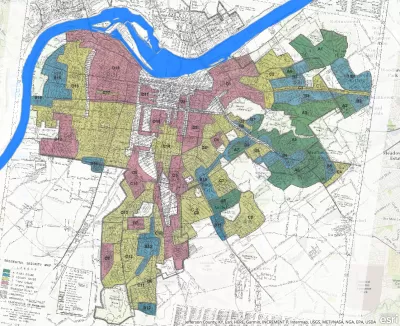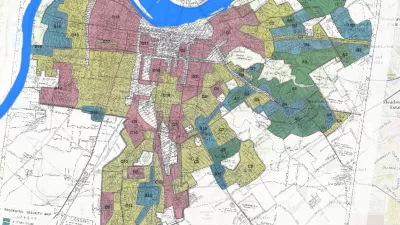The Innovations in Government Program at the Harvard Kennedy School’s Ash Center for Democratic Governance and Innovation has announced the first winner of the "Map of the Month" contest.

Eric Bosco announces the winner of Harvard University's first "Map of the Month" contest. The winning map, called "Redlining Louisville: The History of Race, Class, and Real Estate," was created by the Louisville Office of Redevelopment Strategies to coordinate with a year-long series of public events "to promote community dialogue on the issue of redlining," reports Bosco. (Redlining, as defined by Bosco, is "the denial of services or the refusal to grant loans or insurance to certain neighborhoods based on racial and socioeconomic discrimination.")
According to the history revealed by the map, redlining came to Louisville 80 years ago, and the problem persists to this day, with what Jeana Dunlap, director of redevelopment strategies in Louisville, calls "digital redlining tendencies," with access to broadband internet, health and medical services, and grocery stores.
"The map combines a variety of datasets — vacant properties, building permits, and property values — and includes the original 1937 HOLC Louisville residential security assessment map indicating neighborhood desirability for investment that illustrates the historic redlining. Users can compare HOLC data with current census tract data by property values, race, vacant properties, and home ownership locations," writes Bosco.
The Map of the Month contest recognizes the best data visualizations created by all levels of government and nonprofits, according to Bosco.
FULL STORY: Map of the Month: Redlining Louisville

Maui's Vacation Rental Debate Turns Ugly
Verbal attacks, misinformation campaigns and fistfights plague a high-stakes debate to convert thousands of vacation rentals into long-term housing.

Planetizen Federal Action Tracker
A weekly monitor of how Trump’s orders and actions are impacting planners and planning in America.

San Francisco Suspends Traffic Calming Amidst Record Deaths
Citing “a challenging fiscal landscape,” the city will cease the program on the heels of 42 traffic deaths, including 24 pedestrians.

Bend, Oregon Zoning Reforms Prioritize Small-Scale Housing
The city altered its zoning code to allow multi-family housing and eliminated parking mandates citywide.

Amtrak Cutting Jobs, Funding to High-Speed Rail
The agency plans to cut 10 percent of its workforce and has confirmed it will not fund new high-speed rail projects.

LA Denies Basic Services to Unhoused Residents
The city has repeatedly failed to respond to requests for trash pickup at encampment sites, and eliminated a program that provided mobile showers and toilets.
Urban Design for Planners 1: Software Tools
This six-course series explores essential urban design concepts using open source software and equips planners with the tools they need to participate fully in the urban design process.
Planning for Universal Design
Learn the tools for implementing Universal Design in planning regulations.
planning NEXT
Appalachian Highlands Housing Partners
Mpact (founded as Rail~Volution)
City of Camden Redevelopment Agency
City of Astoria
City of Portland
City of Laramie





























